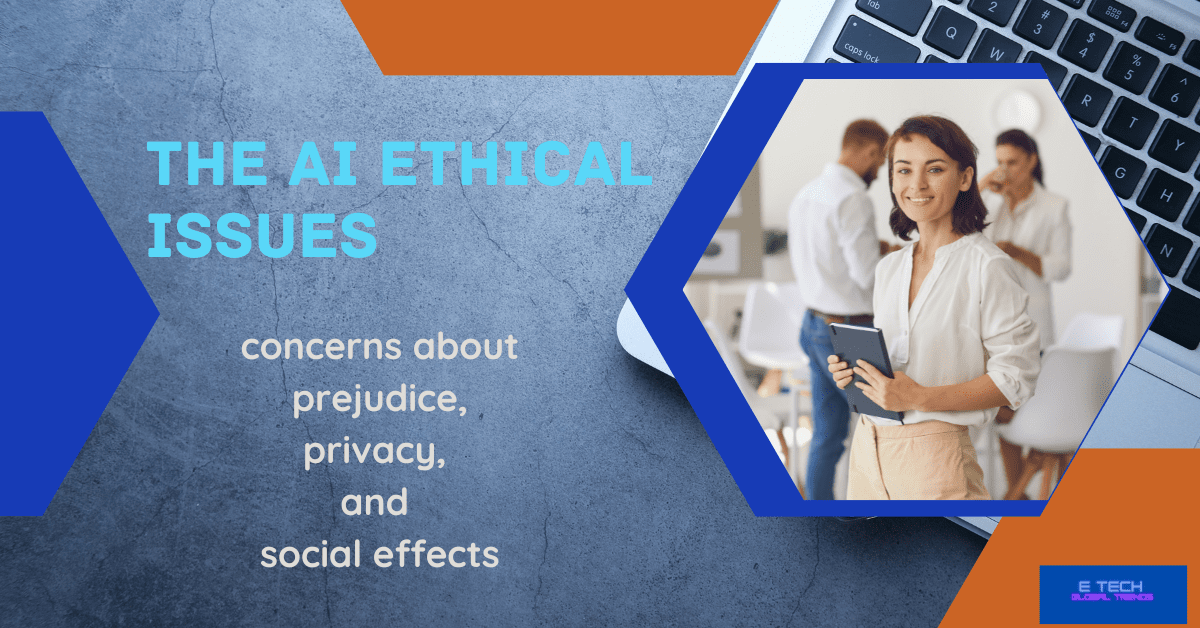AI Ethics
You will wonder why we should keep our eyes on AI Ethics. Do we think about or have no need in concern? Actually, this is not as simple as they appear. It’s high time to analyze before it effects suddenly. Do you agree? The ethical issues underlying the creation and application of artificial intelligence. This is what refers to as AI ethics. This may involve concerns about prejudice, privacy, and social effects.
Let’s dive deep into the topic,
Stay tuned until the end.
The term Artificial Intelligence Ethics use to describe a collection of moral guidelines. They are the things intend to encourage the ethical application of AI.
All sizes of businesses are beginning to take the ethical concerns that adopting AI might raise seriously.
In fact, during the past 2 years, searches for “AI ethical issues” have increased by 218%.
These moral problems could result in defective products, harm to brands, and legal troubles. Several nations are also putting laws on the usage of AI into place.
For instance, the EU is attempting to enact “The AI Act”, a proposed regulation intended to control AI usage and establish a variety of ethical principles.
Over the past 5 years, searches for “responsible AI” have surged by 3K+%.
When using AI, companies might use a framework called “responsible AI” to guide their moral decisions. Responsible AI is ranked in Gartner’s “Artificial Intelligence Hype Cycle” as an innovation trigger.
This indicates that during the subsequent the next decade. interest in ethical AI will grow to the point where it becomes high usage.
What are AI ethics?
In simple terms, AI ethics are a set of rules that provide guidance on the creation and results of artificial intelligence.
People have a variety of cognitive biases that are ingrained in them, including recency and confirmation bias. These biases manifest in our behaviors and ultimately in the data we produce.
So. this is a task of responsibility for AI-related things.
What are the examples of AI ethical violations?
We already see the negative effects of poor AI regulation like the growth of;
- fake news,
- spammy advertising, s
- social media bots, and related frauds.
What is Responsible AI?
The term “responsible AI” refers to the creation and application of AI on the move that is;
- moral,
- open, and
- accountable, and
- that considers the effects that it could have on both society and individual users.
Responsible AI involves the method of creating, developing, and implementing AI with the purpose of empowering employees and organizations and having an equitable influence on consumers and society. This enables businesses to build trust and confidently scale AI.
Reasons for Needing Responsible AI
For instance, a self-driving automobile can use sensors to capture photos. These photos can use in a machine learning model to generate predictions, such as “the object in front of us is a car.” The automobile makes decisions based on these forecasts.
Why do “responsible AI” important?
Any business may afraid of the negative effects, such as the harm to their reputation, of disclosing their weaknesses.
1st reason.
Some businesses wait until they have a “finished product,” hoping to be ready to demonstrate real, positive results before they prepare to share their effort.
The fact that they possess a solid solution and all the solutions to all the issues that are pertinent to their organization must be clear.
2nd reason
Additionally, different industries exhibit different levels of openness. A corporation that routinely discusses bug fixes including new versioning, such as an enterprise software provider, would see Responsible AI as a logical next step.
A corporation that monetizes data, however, could be concerned that fostering this level of openness will raise more stakeholder concerns about the company’s operating model as a whole.
Incorporating Responsible AI into stakeholder input would eventually improve consumer engagement while also preventing reputational harm.
3rd reason
Last but not least, the data science field is continually developing. Just starting to emerge are strategies and structures that integrate ethics into the process of problem-solving.
such as the one released by the University of Virginia scholars.
As a result, data scientists are just now beginning to include Responsible AI principles in their methodology,
such as social effect analyses and bias identification. Data scientists and engineers may foster a sense of community, find solutions to issues, and ultimately advance the field of AI by talking about their difficulties with their counterparts at other firms.
What is the mess with this AI ethics?
Of course, this is unclear, because AI now dominates everywhere.
AI is a tool.
Anyone can use it with care or irresponsibly! So, there are many other ethical concerning levels announced in some communities.
As an example, you cannot create a FB or IG post with AI, clearly violating their guidelines.
This is where the point we address.
Should we concern about AI ethics?
Yes,
it is wise enough in the long run. Don’t wait for the enemy to meet at the gate in panic.
Because regulating AI will be crucial for our society’s future.
The potential consequences of AI’s independence and capacities are potentially too serious.
So, don’t ignore it.
It’s critical to establish limitations for how AI may use, what it can really achieve, and what it can learn.
What benefits can expect a company by integrating Responsible AI?
In order to ensure that ethical, accurate, and productive objectives are achieved, responsible AI is an umbrella of guiding principles that apply to AI technology. What’s more, adherence to these rules helps lessen possible harm to people as well as society.
- Design,
- monitoring,
- governance, and
- awareness-raising training
is the four pillars of responsible AI. The latter speaks about educating people on the best practices for implementing AI rather than model training.
The foundation of responsible AI is ethical AI, which functions as an organizational framework that establishes moral boundaries and enforces adherence to ethical norms.
Although artificial general intelligence (AGI), a kind of artificial intelligence that deals with sentient robots, is not the topic at hand,
There is still a chance of serious harm when ARI is used carelessly, but rather artificial limited intelligence (ARI), or robots that are capable of learning from data and surroundings. An example would be a system that unfairly targets a certain set of people or takes advantage of certain social norms to put people in danger financially or otherwise.
Humans should always come first in AI.
As a tool,
AI must assist people and society in achieving greater goals, and it must be overseen by people to avoid bias and unfairness. There were instances where AI has picked up unwanted features since it is taught on available data and settings, some of which can reveal or reflect inborn prejudices.
See, when you think wisely, there are some significant advantages.
Is so crucial AI ethics in business?
Yes, you cannot ignore that, but the thing is to identify them and look for appropriate solutions.
Such problems are found in other AI systems also.
Failure in data and AI ethics’ operationalization is a significant threat.
because it can expose the companies’ reputational, regulatory, and legal risks.
Therefore it is necessary to find a solution to develop AI systems without failing in the ethical pitfalls. It requires identifying ethical risks throughout the systems.
Too many companies have been sluggish to incorporate AI technology. Others originate from companies that entered the AI market early and have taken advantage of the uncertainty. Due to the lack of restrictions to engage in unethical behavior.
Last but not least, in the era of influential people, there are additionally individuals who bring up AI ethics to build their own personal brands, often without the necessary knowledge.
What are the potential problems that could face a business that neglects AI ethics?
1.0 Reputational harm
Negative situations like privacy violations, biased algorithms, and even unethical behaviors might result from ignoring trust, safety, and AI ethics.
These occurrences may harm a business’s reputation, lose client confidence, and cost it business opportunities.
2.0 Customer Skepticism and churn
Customers’ trust in a company’s goods and services might damage if not prioritize trust and safety. Customers may decide to stop doing business with a company if they believe;
- their data is in danger,
- their privacy has been violated, or
- the activities of the company are immoral,
which will result in customer attrition & a reduction in income.
3.0 lost commercial opportunities
Businesses that disregard trust and safety risk losing out on important commercial prospects. Potential partners, clients, or customers may reluctant to work with a business that does not prioritize ethical issues in industries where customer trust is essential,
for instance, healthcare, finance, or technology. This might prevent collaborations and restrict growth.
4.0 Regulatory and legal hazards
Businesses that put money over reliability and safety may run into legal and regulatory issues. Legal repercussions, fines, and penalties may result from violations of privacy rules, data protection standards, or discrimination legislation.
The impact is operations and prospects for expansion of the company’s greater regulatory scrutiny.
5.0 Increasing regulatory interference
Governments and regulatory organizations may establish harsher rules and restrictions in reaction to public concerns & incidents involving safety and trust or AI ethics. Companies that have not given these factors priority may be subject to stricter regulatory requirements, higher compliance expenses, and increased operational scrutiny.
6.0 loss of social Authorization to act
Companies operate in broader sociocultural environments where public perception and opinion are important factors. The business’s social license for operation may be compromised by disregarding many reasons such as ;
- trust,
- safety, and
- AI ethics,
which may result in demonstrations, public outcry, or advocacy efforts.
As a result, the company’s overall sustainability may harm. and relationships with stakeholders, such as clients, employees, investors, and communities, may suffer.
What ethical issues about artificial intelligence exist?
Well, we’ll list some of them, as follows
1.0 Liability
After learning, anything, human or machine, becomes intelligent. For AI systems to detect the correct patterns, they must also learn from the data.
However, it’s probable that during the learning period, it cannot cover all scenarios, usually. The system can make an incorrect choice when it encountered a new scenario,
in that case. When the AI system makes a mistake. it raises serious questions about who is accountable.
2.0 Bias
AI systems learn by analyzing data and looking for patterns. It also favors certain patterns in the outcome that it produces.
Data may skew to favor a certain community.
3.0 Privacy
A single internet stores the majority of the data digitally. It is challenging to restrict access to data in the digital age.
As a result, deploying AI always poses a danger to data security.
4.0 Security
AI systems that, when employed maliciously, might cause harm. Security is therefore essential.
Because AI is developing, systems are becoming orders of magnitude quicker and more powerful than us.
5.0 Opacity
A lack of auditing, involvement, and responsibility limits the potential for human perception.
Developers and users are unaware of the steps used inside the system to produce the result.
In datasets and decision-making processes, this opacity promotes bias.
This is where the ethical issue may occur.
6.0 Behavior on Modification
Artificial intelligence in surveillance can diminish autonomous rational decisions by using the information to alter behavior. It directly undercuts people’s right to personal autonomy.
What is a code of AI ethics?
Well, administrators are figuring out some code for this.
The world is seeing extraordinary advances in artificial intelligence. There are new applications in finance, defense, health care, and education, among other areas.
Algorithms are improving…
- spell-checkers,
- voice recognition systems,
- ad targeting, and
- fraud detection.
Yet at the same time, there is concern regarding the ethical values embedded within AI and the extent to which algorithms respect basic human values.
Ethicists worry about;
- a lack of transparency,
- poor accountability,
- unfairness, and
- bias in these automated tools.
With millions of lines of code in each application, it is difficult to know what values are inculcated in software and how algorithms actually reach decisions.
Technology corporations are progressively assuming;
- the role of digital sovereigns,
- dictating the laws of the land, and
- the structure of the code,
including the terms of service they will offer while they push the bounds of innovation.
The decisions that software developers make when developing code have a huge impact on how algorithms work and make judgments.
Who is administrate AI ethical concerns?
Respectively within countries, it has to keep control of the legal organization.
As an example, in the USA, American Association for Artificial Intelligence (AAAI) takes care about AI ethics.
In order to ensure AI applications are utilized safely and morally, the AAAI highlights the significance of responsible & ethical AI use. It also provides recommendations.
Additionally, it’s better to review the AI ethics guidelines.
Is there any road map for AI ethics?
Yes, why not?
But it would come up with a total effort.
Do you agree?
The foundation of AI ethics is duty and accountability. Who is accountable whenever AI systems decide to benefit or hurt people must be established.
To address questions of liability and assure accountability for the acts of AI systems, clear rules and legal frameworks are needed.
Finally, it is important to carefully evaluate how AI will affect society and the economy. It is vital to make sure AI technologies are available, helpful, and utilized for society as a whole. Prioritization should be given to mitigating risks like escalating inequities, increasing power concentrations, or unforeseen outcomes.
In order to ensure that AI is created and used in a trustworthy, open, and morally sound manner, it is important for technology developers, legislators, and society at large to work together to address these ethical problems.
Summary
Numerous ethical questions have been brought up by the increasing sophistication and pervasiveness of AI applications. These include concerns about unfairness, safety, accountability, and openness. The concern is that AI will be prejudiced, unjust, or lack adequate transparency or accountability in the absence of systems that adhere to these standards.
Many nongovernmental, academic, and even corporate groups have issued statements for the protection of fundamental human rights in artificial intelligence and machine learning due to worries about potential issues. These organizations have laid down guidelines for creating AI systems as well as procedures to protect people.
Hope this content is useful
Cheers!
Read more on related topics: Generative AI, Penetration testing device







